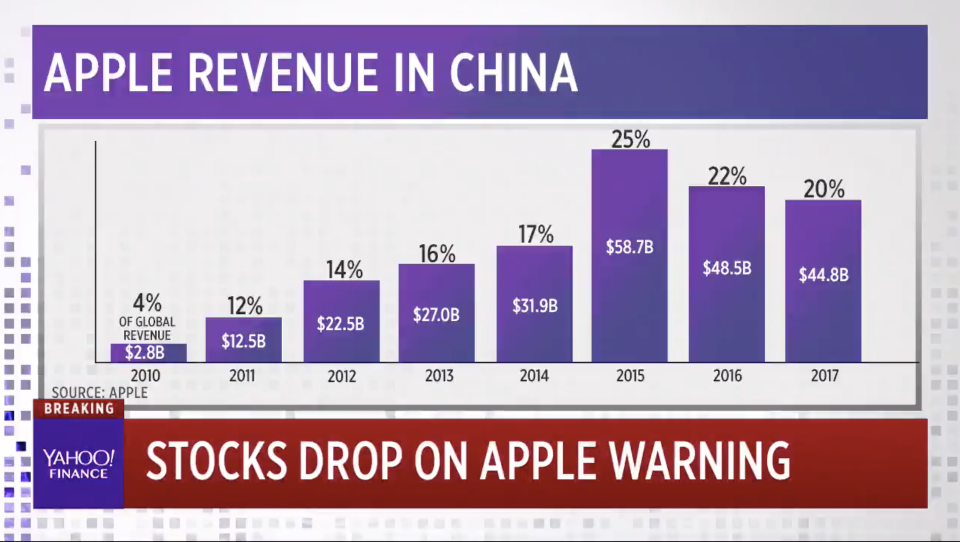Munster: China is only two-thirds of Apple's problem
Apple (AAPL) may be blaming China for its expected revenue shortfall for the first quarter of 2019, but analysts counter that expensive iPhones are also Apple’s problem.
CEO Tim Cook’s comments about weakness in emerging markets and Greater China caused Apple shares to plunge 9.96% on Thursday.
But while Cook “probably emphasized a little more on the China impact, we see that as two-thirds of the reason for the shortfall,” Loup Ventures Managing Partner Gene Munster said on Yahoo Finance’s Midday Movers.
Munster argued that the short-sighted increase in the price of the iPhones impacted upgrade rates — causing the other third for Apple’s recent woes.

“There was this concept that Apple had a free pass in the fall of 2018 to continue to test higher ASPs [average selling prices] around the iPhone. They did that in earnest — they raised the iPhone ASP by 23% this fall and that had a negative impact on upgrades.”
‘Darkest days in Apple’s history’
It was “one of the darkest days in Apple’s history,” Dan Ives, managing director of equity research at Wedbush Securities said later in the program. He said Apple’s problem involved the company having “pricing hubris” and suffering from a “massive misexecution, specifically in China.”
Analysts from Citi even imagined a scenario where if China sales went to zero, they found that it would cause a drop of around $20 to $30 in Apple’s stock price.

While both Munster and Ives agree that Apple needs to cut prices — with Ives specifically advocating price cuts for the iPhone XR — Munster was still optimistic about the stock, noting that Apple is on track to report a record earnings quarter, which is getting “lost in the letter.”
“Even though investors clearly focus on revenue growth as the primary driver to the stock, I think that the earnings piece is important because that essentially gives the company capital to either more aggressively buy their stock back to do M&A, they could also invest more aggressively in new products,” said Munster.
Apple’s problem is even bigger than expensive iPhones
And as Apple hikes prices on iPhones, Chinese smartphone makers are creating cheaper, high-quality products that are possibly eroding Apple’s loyal customer base.
Referring to Chinese smartphone maker Huawei, Academy Securities Head of Macro Strategy Peter Tchir said that “this company has probably taken a lot of technology from U.S. companies and now is a true competitor.”

So success like Huawei’s erodes Apple’s market share. “Chinese companies are much better than they were 2, 3, 4 years ago and we’re going to have to be innovative and competitive with them,” Tchir added.
Ives projects that the next four to six quarters are going to be important for Apple in terms of retaining their existing user base. “350 million are in the window of an upgrade opportunity, [and] 60 to 70 million of those are in China. You need to have a fence around your backyard.”
Tchir noted that “not only do we have to worry about making sure we’re winning business in China, [U.S. companies] have to make sure we have to protect our business here and create better products that consumers can afford and want.”
Aarthi is a writer for Yahoo Finance. Follow her on Twitter @aarthiswami.
READ MORE:
What Tim Cook left out about China in Apple’s revenue guidance
Origin story: Apple’s journey from Steve Jobs’ garage to $1,000,000,000,000
Follow Yahoo Finance on Twitter, Facebook, Instagram, Flipboard, LinkedIn, and reddit.

 Yahoo Finance
Yahoo Finance 